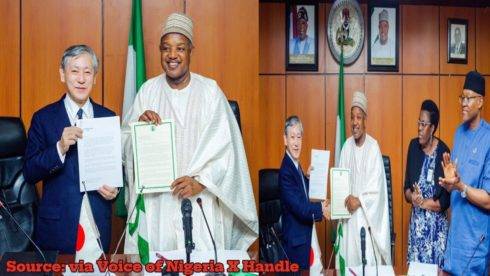The Nigerian government, led by Minister Sen. Abubakar Atiku Bagudu, has entered into agreements with Japan to bolster the Rice Seeds Production System. This project holds immense significance for Nigeria’s agricultural sector, as it aims to achieve self-sufficiency in rice production. With Nigeria being one of the largest consumers of rice in Africa, this initiative could potentially reduce the country’s reliance on rice imports and boost its agricultural output.
The signing of these agreements signifies a step forward in Nigeria’s quest for food security and economic stability. By partnering with Japan, known for its expertise in agricultural technology and innovation, Nigeria can leverage resources and knowledge to modernize its rice production methods. This collaboration not only holds promise for increasing rice yields but also for creating employment opportunities and stimulating rural development across Nigeria.
Minister Sen. Abubakar Atiku Bagudu, Strengthening the Nigeria Centre for Disease Control (NCDC) Through Collaboration with Japan
In another significant development, the Nigerian government has joined forces with Japan to strengthen the Nigeria Centre for Disease Control (NCDC). With the world witnessing the devastating effects of the COVID-19 pandemic, enhancing diagnostic capacity and healthcare infrastructure is paramount for effectively combating present and future health crises.
The partnership between Nigeria and Japan underscores the importance of international cooperation in addressing global health challenges. By upgrading the NCDC’s capabilities, including laboratory facilities and disease surveillance systems, Nigeria aims to better detect, respond to, and control infectious diseases. This initiative not only benefits the Nigerian population but also contributes to regional and global health security.
Minister Sen. Abubakar Atiku Bagudu Leads Nigerian Delegation in Agreement Signing
Minister Sen. Abubakar Atiku Bagudu played a pivotal role in the recent agreements signed between Nigeria and Japan. His leadership and diplomatic efforts have paved the way for collaboration between the two nations in critical areas such as agriculture and healthcare. As Nigeria seeks to diversify its economy and improve the well-being of its citizens, Minister Sen. Abubakar Atiku Bagudu’s initiatives reflect the government’s commitment to driving socio-economic development.
Under Minister Sen. Abubakar Atiku Bagudu’s guidance, Nigeria is forging strategic partnerships with countries like Japan to harness their expertise and resources for the benefit of its people. Minister Bagudu’s vision for a more resilient and prosperous Nigeria aligns with the aspirations of the populace, making him a key figure in the nation’s journey towards progress and prosperity.
Japanese Ambassador Matsunaga Kazuyoshi Emphasizes Commitment to Nigerian Development
Japanese Ambassador Matsunaga Kazuyoshi reiterated Japan’s commitment to supporting Nigerian development initiatives during the signing ceremony. His remarks underscored Japan’s longstanding partnership with Nigeria and its dedication to fostering growth and stability in the region. Ambassador Kazuyoshi highlighted the importance of collaboration in addressing common challenges and achieving shared goals.
By reaffirming Japan’s commitment to improving Nigerian lives through cooperation in the health and agriculture sectors, Ambassador Kazuyoshi reaffirmed the strong bonds between the two nations. His words serve as a testament to the enduring friendship and mutual respect that characterize the Nigeria-Japan relationship, setting the stage for continued collaboration and progress in the years to come.
Sen. Abubakar Atiku Bagudu: Alignment with Nigeria’s Goals of Diversification and Economic Growth
The agreements signed between Nigeria and Japan are in line with Nigeria’s strategic objectives of diversifying its economy and fostering sustainable growth. By prioritizing investments in agriculture and healthcare, Nigeria aims to reduce dependency on oil revenues and create a more resilient and inclusive economy. These projects not only address immediate challenges but also lay the foundation for long-term prosperity and development.
As Nigeria strives to overcome socio-economic hurdles and unlock its full potential, partnerships with countries like Japan play a crucial role in driving progress. By leveraging Japan’s expertise and resources, Nigeria can accelerate its journey towards achieving key developmental milestones and improving the quality of life for its citizens. These initiatives reflect Nigeria’s proactive approach to addressing pressing issues and building a brighter future for generations to come.
Nigeria-Japan Collaboration Sparks Social Media Buzz on Socioeconomic Development
The Nigeria-Japan collaboration is igniting substantial interest on social media platforms, as evidenced by the trending hashtags #Nigeria, #Japan, #SocioeconomicDevelopment, #Healthcare, #Agriculture, and #Cooperation. This surge in online engagement underscores the public’s keen interest in initiatives geared towards fostering socioeconomic progress and improving livelihoods. By leveraging the power of social media, stakeholders can magnify the impact of these collaborative efforts and disseminate information regarding their potential advantages. This dynamic online discourse serves as a platform for engaging policymakers and citizens in advocating for the success of these projects, thereby promoting transparency and accountability in their execution.
Furthermore, the evolving digital conversation surrounding the Nigeria-Japan partnership acts as a catalyst for increased transparency, accountability, and public involvement in shaping Nigeria’s development trajectory. Through active participation in online discussions, citizens are empowered to contribute to the formulation and implementation of policies that directly impact their lives. This inclusive approach not only enhances the effectiveness of development initiatives but also fosters a sense of ownership and shared responsibility among all stakeholders. As social media continues to serve as a vibrant space for dialogue and information exchange, it plays a pivotal role in driving forward the agenda of socioeconomic advancement and fostering mutual cooperation between Nigeria and Japan.
Table of Contents
Discover more from OGM News NG
Subscribe to get the latest posts sent to your email.














